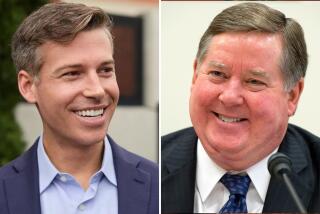Runoff in redrawn Texas district could be a tight race
- Share via
HOUSTON — One of the nation’s last unresolved House races will be decided Tuesday when seven-term Republican Rep. Henry Bonilla faces former congressman Ciro Rodriguez in an unusual runoff in a newly redrawn district.
In a special election Nov. 7, a well-financed Bonilla won 49% of the vote, just shy of the majority he needed to win outright.
Rodriguez, 59, who represented a neighboring district in the House from 1997 to 2005, finished second with about 20% of the vote.
Bonilla, 52, was at one time strongly favored to win without a runoff. Though his conservative stands on issues such as immigration had eroded Latino support, a 2003 redistricting plan engineered by former House Majority Leader Tom DeLay minimized the problem by cutting the number of Latino precincts in Bonilla’s district. In 2004, Bonilla won with 69% of the vote.
However, the U.S. Supreme Court ruled in June that the new district lines unconstitutionally diluted minority votes. A panel of three federal judges reconfigured the district in August.
In its current form, the 23rd congressional district -- the largest in Texas -- stretches from San Antonio to the Texas-Mexico border and out to far West Texas. Sixty-one percent of the district’s voting-age population is Latino, compared with 51% in 2004.
Now that Democrats have taken over Congress, there’s a new dynamic in play, said Andy Hernandez, a political scientist at the University of Texas at San Antonio.
“I think ordinary Democratic voters are hepped up and there’s a growing energy to beat Bonilla and finish the job in Texas,” Hernandez said. “I don’t think his conservative Anglo base has enough enthusiasm to save him.”
Larry Hufford, a political scientist at St. Mary’s University in San Antonio, disagreed, saying voter turnout in runoff elections is notoriously low in the south Bexar County precincts that are Rodriguez’s strength.
“If early voting and turnout in this election parallels past elections, Republicans will turn out in higher numbers and Bonilla should win,” Hufford said.
The latest public poll shows Bonilla leading Rodriguez 53% to 46%, but the race could be much tighter, Hernandez said.
“If Henry Bonilla couldn’t win outright in the special election with his money and name recognition, he’s in deep trouble,” Hernandez said.
Campaign finance reports show that as of Nov. 22, Bonilla, with $955,000, had almost 10 times the cash on hand as Rodriguez, with $94,000. But the Democratic Congressional Campaign Committee has reportedly spent about $871,000 on Rodriguez’s behalf.
The candidates have spent much of the money on attack ads but, in a district largely bordered to the south by Mexico, have avoided the topic of immigration. Bonilla voted in favor of a 700-mile border fence; Rodriguez has said he would not have. The topic isn’t listed as an issue on either candidate’s campaign website.
“They’re scared” to talk about it, Hufford said, perhaps because missteps could alienate one or more groups in a diverse district voting population: West Texas ranchers, Latinos in border towns, Republicans on the north side of San Antonio and Democrats in the south.
Chad Foster, president of the Texas Border Coalition, a group of border mayors and judges, said Bonilla’s vote in favor of the fence angered many in the area. “I don’t think the fence is realistic. It’s an 18th century solution to a 21st century problem,” said Foster, who also is mayor of the Texas border town Eagle Pass.
However, Bonilla spokesman Phil Ricks said border sheriffs believed the fence would curb drug smuggling and human trafficking. “People are in favor of the fence,” he said.
Bonilla won the majority of the west Texas counties in his district during the special election.
Tuesday’s runoff falls on a holy day for many Roman Catholic Latinos -- the Feast of the Virgin of Guadalupe.
Latino groups protested when Texas Gov. Rick Perry set the date, saying it was an attempt to help Bonilla by suppressing the Latino vote. But after early voting was extended, the Justice Department approved the runoff date.
More to Read
Sign up for Essential California
The most important California stories and recommendations in your inbox every morning.
You may occasionally receive promotional content from the Los Angeles Times.













